In a meeting with hundreds of students
The jobs being done about the Economy of Resistance is good provided that it continues
The jobs being done about the Economy of Resistance is good provided that it continues
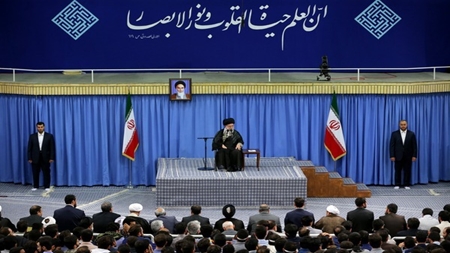
More than one thousand students, including representatives of different student unions, in an almost five-hour cordial meeting on Saturday with Leader of the Islamic Revolution Ayatollah Seyyed Ali Khamenei, spoke about student-life, cultural, social, political and economic concerns of the younger generation and heard directly the views of the Leader of the Islamic Revolution about “student and academic issues, important tasks of students with regard to the resistance of the nation as well as a variety of topics and issues of the day”.
At the beginning of his remarks, the Leader of the Islamic Revolution noted that annual meetings held with students during the holy fasting month of Ramadan are really appealing and favorable, saying: "Diverse issues and different viewpoints that were raised in the meeting were good and attractive and indicate the growth of the intellectual level and the demands of students, and shows that with the turn of time, revolutionary motivations and bright thinking and well-founded argumentation have enjoyed significant and daily-increasing growth among the students."
Ayatollah Khamenei recommended students to further familiarize with the holy Quran and prayers, saying: “My main point with you, students, is to strengthen faith because only with strong faith can one combat and resist problems and pressures.”
The Leader of the Islamic Revolution drew a parallel between the current special and sensitive circumstances in the country and the Battle of Ahzab (parties) in the lifetime of Prophet Muhammad (Peace Be Upon Him), adding: “Today also, all mammonists and bullying powers in the world are arraying troops against the Islamic Republic of Iran and are targeting it from all fronts.”
“Under such circumstances, those with weak faith and perhaps inner tendencies toward the enemy express disappointment and disillusionment and inferiority, but people with strong faith resist with firmer determination and will, no matter how difficult the conditions are,” said Ayatollah Khamenei.
The Leader of the Islamic Revolution said: “If we want to resist the Arrogant Front and achieve the dignity and honor which the Islamic Republic establishment deserves we need to preserve and strengthen piety in our personal and public behaviors.”
Citing verses from the holy Quran about the decadence of future generations in the faithful nations, Ayatollah Khamenei said: “‘Spoiling daily prayers’ and ‘following carnal desires’ are the two main factors of decadence and weakening of steadfastness and combat.”
“The reason for which I constantly notify officials of preventing the holding of mixed student trips relies on this basis, because flouting religious restrictions and constraints weakens the inner faith,” said the Leader of the Islamic Revolution.
After elucidating the role of faith in resistance, Ayatollah Khamenei referred to the “fateful and inevitable combat of the Iranian nation with the Arrogant Front” and said: “The beginning of this fight was where the Iranian nation decided to become independent and advanced and this issue is incompatible with the interests of dominant world powers.”
Ayatollah Khamenei dismissed as superficial and not thought-out remarks by certain people that the Islamic Republic is seeking pretexts for incompatibility with world powers, adding: “This fight does not need any pretext because this fight goes on as long as the Iranian nation is standing [firm] based on its revolutionary zeal and background and Islam[ic beliefs] and it (this fight) will end in two fates; either the Islamic Republic becomes so powerful and capable that the opposite party will not dare launch any aggression or the Islamic Republic will lose its identity and will be left with a spiritless appearance.”
Noting that the first option, i.e. “acquiring full authority”, is envisaged by the Iranian nation, the Leader of the Islamic Revolution said: “Of course today the policies of the United States may be seeking to make a distinction between the Islamic establishment officials and divide them as good and bad officials, but if the Americans get powerful enough they will even consider the so-called good officials as bad ones.”
Ayatollah Khamenei said the very principle and the identity of the Islamic establishment’s ipseity was the main target of the enemies’ fight with the Iranian nation, adding: “By Islamic establishment, we mean the entire structure of the establishment and its values and objectives like justice, scientific progress, ethics, democracy, abidance by law and idealism.”
Laying emphasis on the point that this fight is facing big problems that could be resolved through resistance and foresight, the Leader of the Islamic Revolution said: “Throughout this fight and also throughout the resolution of problems, the students, as the very essence of the capabilities of the nation, enjoy a special standing and have a special role.”
The Leader of the Islamic Revolution described the “students’ demanding behavior” as very important and noted: “It will be up to high-ranking officials to resolve the country’s major problems, but the students’ demanding behavior, if accompanied with studying and precise and correct information, will definitely pave the way for further efforts by officials to resolve the problems.”
Ayatollah Khamenei referred to some issues the students highlighted in the meeting, including the issue of new oil contracts, saying: “As long as the necessary amendments are not made to these contracts within the framework of the country’s interests, no such agreements will be signed.”
The Leader of the Islamic Revolution referred to some criticisms raised by students about the current decision-making by some organs in the country, saying: “According to the law and logic, the Leader cannot interfere with minor and executive decision-makings of organs and if executive officials go the wrong way Majlis (parliament) must use such regulatory tools as impeachment or the president must block the implementation of the erroneous decisions.”
“Of course, if the Leader feels that in certain cases, some actions even minor ones are likely to cause the deviation of the [Islamic] establishment from the right path, he has to intervene and stop that plan,” said Ayatollah Khamenei.
The Leader of the Islamic Revolution referred to the problems stemming from combat and resistance in the country’s national drive, saying: “In this regard, certain issues like boosting the economy and enhancing defense capabilities are among the major issues in the country and it will be up to officials to make them materialize and resolve their problems.”
“Certain problems are internal, for which student unions must rush to offer solutions to help officials,” said Ayatollah Khamenei.
The Leader of the Islamic Revolution said a key to the resolution of the problems was distancing from disillusionment and fatigue and told student unions: “If you resist and, by mobilizing people’s minds, change demands into public discourse the officials will have to respond to your demands.”
Ayatollah Khamenei also referred to a point raised by one of the students about the negative consequences of speaking against the remarks of the Leader, saying: “We have said time and against that speaking against the Leader does not amount to an offense, nor will it face opposition.”
The Leader of the Islamic Revolution went on to describe the country’s students as a big opportunity, major asset and a strong point for the Islamic establishment. Underscoring the necessity for officials to pay special attention to this stratum in planning, Ayatollah Khamenei said: “Compared with students in the very early days of the [1979 Islamic] Revolution, today’s students are of higher standing [both] quantitatively and qualitatively and have more deep-seated revolutionary and Islamic thoughts.”
“Many of highly motivated and revolutionary students of the immediate post-revolution years are today among the country’s researchers and scientists. Therefore, there is no contradiction between being revolutionary and studying,” said the Leader of the Islamic Revolution.
Ayatollah Khamenei recommended students to be studious while bolstering their faith and spirituality, and said: “Students must be also endowed with insight and look at student environments and the issues and developments of the country, the region and the world with open eyes.”
The Leader of the Islamic Revolution said: “In the absence of open eyes and insight, student are susceptible to making mistakes and calculation errors in distinguishing friends from foes or in analyzing regional and international affairs.”
Ayatollah Khamenei called on students to develop “suspicions about the enemy’s media campaign”, saying: “Having spent exorbitant costs, the enemies have embarked on a complicated and extensive media campaign against the Islamic establishment and its main objective is to cover up the strong points of the Islamic Republic and highlight certain negative points in a bid to insinuate despair and disillusionment into the minds of people and youth.”
The Leader of the Islamic Revolution said foreign media’s refusal to provide adequate coverage of the massive and lively presence of people in International Quds Day rallies this year as an example of the enemy media stream’s behavior, saying: “The Quds Day rally on Friday by fasting people in very hot weather is really phenomenal, but this distinctive phenomenon was not reflected as it should have been in foreign media, while if there is a negative point they magnify it hundreds of times.”
Ayatollah Khamenei went on to say that students who are members of unions should feel more responsible than the others, and referring to the sophisticated labyrinth of politics, the Leader of the Islamic Revolution said: “In the first decade of the Revolution and during the Sacred Defense (1980-1988 Iraq-Iran War), confronting the enemy was an evident task and understandable to the public, but today the intertwinement of different cultural, social, political, economic and security issues have created fully complicated conditions which require heavier tasks. Facing these conditions requires open eyes, scrutiny, wisdom and foresight.” After elucidating the sophisticated and multidimensional structure of the present circumstances, Ayatollah Khamenei gave 12 pieces of advice to student unions to consider in exercising their tasks.
Ayatollah Khamenei’s first piece of advance to active students was “intellectual presence in the main issues of the country and physical presence when necessary”.
The Leader of the Islamic Revolution said it was important for student unions to take stance with regard to the main issues of the country, adding: “If these strong and principled positions are expressed clearly, the friends of the Revolution will get stronger and the enemies of the country, including the Americans, will understand that they should not feel happy with doctored and unrealistic reports about Iranian youth.”
Ayatollah Khamenei said the “Joint Comprehensive Plan of Action” (Iran’s nuclear agreement with world powers), “[resumption] of ties with the US”, “Economy of Resistance” and the “Future of the Country” were among important issues about which student unions, in their capacity as soft war officers, must express their revolutionary, well-reasoned and strong positions.”
The Leader of the Islamic Revolution said “precise and correct information, being well-reasoned and timely” as the requirements for student unions in taking stances, adding: “Such stances must be widely reflected in campus magazines. Meantime, these stances could be spread across the society through other methods like speeches by the representatives of unions before Friday Prayers sermons in big cities.”
The Leader of the Islamic Revolution said students are also required to hold gatherings from time to time, but they must opt for the right method and abide by the law.
Ayatollah Khamenei reiterated his opposition to any heckling of gatherings and forums, saying: “That would be harmful or at least useless. If necessary you must hold gatherings and meetings to explain to students your position vis-à-vis counter-gatherings because students are seeking truth.”
In this regard, the Leader of the Islamic Revolution called on the Ministry of Science, Research and Technology, the Ministry of Health as well as university officials to help revolutionary student unions, and said: “Of course, all unions are equal in terms of enjoying public rights, but it would be natural and logical for university officials to defend and support the revolutionary and faithful unions and provide the ground for their more active presence.”
“Elucidation and persuasion of hearts” was the second piece of advice given by Ayatollah Khamenei to student unions.
“In Islamic thinking, persuasion and attraction of hearts constitutes an important principle and student unions must elucidate their positions to students and people by citing strong and clear arguments,” said the Leader of the Islamic Revolution.
Ayatollah Khamenei described such issues as the “Economy of Resistance, scientific progress, lifestyle and resumption of ties with the US” as topics which require active student groups to take positions on.
Regarding ties with the US, the Leader of the Islamic Revolution said: “Student unions must reflect on some positions taken by the Leader including ‘the rejection of renewed ties with the US and negation of negotiations with this country except for special and specified cases’ and with a clear understanding of existing well-argued reasons elucidate them to students and non-students through solid-based and well-argued methods.”
Ayatollah Khamenei said “continuance as well as accurate, clear and well-argued expression of the positions of revolutionary student unions” was effective and necessary in forming public demands and leading the country on the right path.
“Raising the level of political and religious awareness” was the third piece of advice given to student unions by the Leader of the Islamic Revolution.
Ayatollah Khamenei said “development of student audiences” was another task assigned to student unions, adding: “Ethics, patience, tolerance of opposite voices and understanding of affairs are preludes to fulfilling this task.”
The fifth piece of advice to the students was to “defend the Islamic establishment frankly and fearlessly”.
The Leader of the Islamic Revolution said: “By benefiting from shortages, flaws and faults, the enemy is understating the value of the Revolution and ignores instances of progress and success. Student groups are required to change this non-equilibrium.”
Ayatollah Khamenei added: “Steadfastness against 37 years of all-out enmity by the gigantic front of material powers is the most important success for the decent and honorable Islamic establishment, particularly under conditions in which a simple grimace by these material powers will make the pretentious monarchy bend down and give in.”
The Leader of the Islamic Revolution said the joyful quantity and quality of revolutionary students was a sign of liveliness and the intrinsic talent and capacity of the Islamic Revolution, adding: “Of course by defending the establishment I do not mean defending the Leadership. Rather I mean defending a collection of intertwined values based on which the Revolution proceeds with its growth and exuberance.”
“Continuance and development of jihadi trips to villages and underprivileged areas” was the sixth piece of advice expressed in this meeting by the Leader of the Islamic Revolution.
“Jihadi trips are at times self-purification, service providing and familiarity with the real conditions of the country,” said Ayatollah Khamenei.
The Leader of the Islamic Revolution highlighted his repeated notices to the current administration and all its predecessors about the development of villages, saying: “Realizing this issue has clear methods with establishment of small-sized and conversion industries being one of them. Of course, putting this repeated advice into action needs ambition.”
The seventh and the eighth pieces of advice expressed by Ayatollah Khamenei to student groups were “attention to Iranian-Islamic lifestyle in thought and in practice” and “strengthening the main discourses of the Revolution including justice, knowledge-based economy, Economy of Resistance, Islamic-Iranian progress and scientific leap”.
In this regard, Ayatollah Khamenei said: “I personally accept by no means the Western-style development because its foundations and fundamentals are wrong and that is why we have broached the ‘Islamic-Iranian progress discourse’.”
Regarding the Economy of Resistance, the Leader of the Islamic Revolution said: “According to reports which I have received, the job being done is good provided that it continues.”
In his ninth piece of advice, Ayatollah Khamenei called on student groups to “form an anti-US, anti-Zionist united front at the level of students across the Muslim world”.
“With advanced communications tools and in the cyberspace, it is possible to form public campaigns of Muslim students based on opposition to the policies of the US and the Zionist regime so that millions of young Muslim students, by taking position, would launch a tremendous drive in the Muslim world if needed” said Ayatollah Khamenei.
In his 10th piece of advice, the Leader of the Islamic Revolution called on students to “avoid accusing people of being non-revolutionary”.
“Being revolutionary has specific terms and criteria and you should not accuse those whose views do not fully conform to yours, while they [actually] meet the [main] criteria of being revolutionary,” said Ayatollah Khamenei.
“Synergy of revolutionary groups at universities by leaning towards common points” was the 11th piece of advice by Ayatollah Khamenei for the students.
“Differences should not turn into tug-of-war and revolutionary groups must act so as to institute patience and tolerance of opposition at academic environments,” the Leader of the Islamic Revolution said.
Ayatollah Khamenei’s last piece of advice was about holding a “strategic view vis-à-vis the Revolution and reflecting on the future”.
“The presidents of the coming decades, members of parliament and future officials of the country will be picked from among you dear [students]. Therefore, with a fully hopeful and lively view, sketch out a utopist image of the country for the next 20 to 30 years and arrange your drive today in the light of such a bright horizon,” the Leader of the Islamic Revolution said.
Concluding his remarks, Ayatollah Khamenei highlighted several points about domestic issues.
The Leader of the Islamic Revolution criticized those who have not taken a position on the issue of sedition despite their claimed support for the Islamic establishment, the late revolutionary founder Imam Khomeini and the Islamic Revolution, noting: “My positions about the sedition of the [calendar] year 1388 (2009 post-election riots) are fully clear and I am sensitive to this issue and the yardstick is refraining from supporting those who spearheaded the sedition or those who took advantage of it and have not yet disavowed it.”
Noting that such division as principlist and reformist or modern reformist and traditionalist principlist are not important at all, Ayatollah Khamenei said: “What counts is the content.”
The Leader of the Islamic Revolution also referred to issues related to the necessity of wisdom in the country, saying: “In these days, there is a lot about rationalism and the necessity of dialogue between wise individuals from [political] factions. The very principle of the issue of rationalism is very favorable and endorsed by Islam and Quran and the late Imam was one of the leading wise individuals of the world.”
Ayatollah Khamenei said the Islamic Revolution was a wise revolution, adding: “Based on rationalism, we must say that those who believe in resorting to the West for the country’s progress have lost their wisdom because wisdom recommends taking lessons from experiences.”
The Leader of the Islamic Revolution highlighted the Iranian nation’s bitter experiences of the West including the imposition of Pahlavi dictatorship and despotism, the overthrow of the national government (that of democratically-elected Prime Minister Mohammad Mossadeq in a coup in the 1950s) and establishment of the dreaded apparatus of suppression SAVAK (the intelligence service of the Shah regime), saying: “Even in the aftermath of the victory of the Islamic Revolution, the first [raft of] sanctions, [instances of] treason, [acts of ] espionage, widespread propaganda campaigns, support for counter-revolutionary groups, imposition of the eight-year war, full-fledged support for [Iraqi dictator] Saddam [Hussein], downing of [the Iranian] civilian plane as well as non-commitment and obstructionism in the [implementation of the] JCPOA have all been [done] by the Western governments and particularly the US.”
Referring to the very bad performance of the French and the Americans in the issue of JCPOA, the Leader of the Islamic Revolution said: “In the issue of the JCPOA, it was proven that the Americans including Congress and Administration are still preoccupied with enmity with the Iranian nation.”
“Wisdom necessitates tackling such enmity wisely and with foresight and we should not be duped and step into a field it has sketched out,” said the Leader of the Islamic Revolution.
Ayatollah Khamenei pointed to the Americans’ allegations about their interest in negotiations and coordination with Iran about regional issues including Syria, saying: “We do not want such coordination because their main objective is to end Iran’s presence in the region.”
Laying emphasis on the fact that the Islamic Republic of Iran favors US absence and non-interference in the region, the Leader of the Islamic Revolution said: “These positions of the Islamic establishment about the issues of the region lie within the framework of wisdom.”
Ayatollah Khamenei noted: “By virtue of my religious and ethical obligation, I will resist as long as I live and I trust people too as I am ascertained of the outcome of resistance, i.e. victory.”
The Leader of the Islamic Revolution said: “Among the country’s elites, particularly academics and students, pious figures who believe in resistance are numerous enough to encourage even the disillusioned ones.”
At the start of this meeting, eight representatives of student unions, Misters
Ehsan Ebrahimi, representative of Basiji students
Mohammad Hossein Qa’ed Sharif, representative of the Union of Unity Consolidation
Mojtaba Raeisi, representative of Student Justice-Seeking Movement
Mohammad Ahangaran, representative of struggling groups
Ali-Reza Ahmadi, representative of the Islamic Independent Students Association
Mohammad-Ali Kamfirouzi, representative of managing editors of campus magazines
Hossein Zeinalian Boroujeni, representative of the Union of Islamic Students Society
And Ms. Fatemeh Sadat Zarrabi, representative of the Union of Islamic Azad University student unions expressed the views and concerns of student groups for more than two hours.
The most important points highlighted in the remarks by the student representatives were as follows:
Expressing concerns about the threat of internal extermination by individuals and currents who do not deeply believe in the fundamentals of the Islamic Revolution and Imam Khomeini.
The necessity of reforming corrupt-inspiring structures in the banking and administrative system and firm action against the corrupt and offenders
Criticism of lack of serious commitment by some officials to the articles of the Constitution and the policies of the Islamic establishment in the political, economic and cultural domains
Necessity of elucidating methods of expression of demands by students vis-à-vis flaws and faults
Criticism of labeling demands and students’ follow-up on their demands with officials as political
Crystal clear elucidation of the defense principles of the country for people and youth and explaining the reasons of support for the anti-Israeli axis of resistance in the region
Criticizing the spread of aristocracy among some officials
Criticism of negligence of cultural issues by officials at the Ministry of Science, Research and Technology
Providing facilities for the marriage of students
Criticizing the facilitation of infiltration of foreigners into universities under the cover of scientific diplomacy
Expression of concerns about economic, political, cultural and educational infiltration by foreigners under the cover of globalization
Criticism of attempts by certain individuals to generalize the JCPOA model to regional, defense and human rights issues
Enquiry about the ways to stand against the non-revolutionary current inside the Islamic establishment to avoid polarization
Criticism of slogan-style remarks by certain official on the issue of the Economy of Resistance
Criticism of the performance of municipalities in big cities and the unbridled expansion of shopping centers and the negative cultural and social fallouts from these centers
Necessity of recruiting young people in the executive bodies
Criticism of judicial action against some press and campus and union magazines
Necessity of elucidating methods of interaction with the devotees of the Islamic establishment who hold different views
Expression of concerns about the scheme of removing ideals from the Islamic Revolution in foreign policy
Criticism of some judiciary officials and non-transparent information about some verdicts issued by courts
Criticism of deferment of a motion for supervision on the performance of MPs
Criticism of the performance of some officials in justifying the hostilities of the US and making efforts to cover up the US face
Strong criticism of inaction toward obstructionism and violations of JCPOA by the US
Necessity of formulating a high-level blueprint for the development of villages and the expansion of activity of construction project groups in underprivileged areas
Importance of the Islamic Republic’s 20-year Vision Plan and the current unfavorable process in achieving its objectives
During this ceremony, Ayatollah Khamenei led evening prayers. The students then broke their fast in the presence of the Leader of the Islamic Revolution.



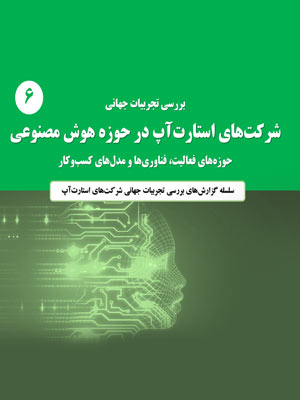



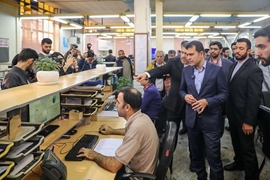
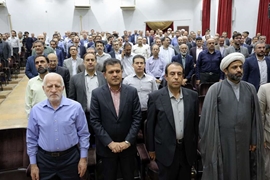
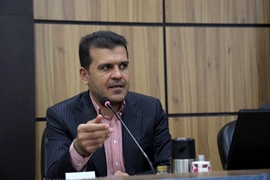
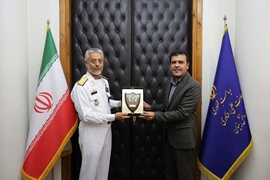

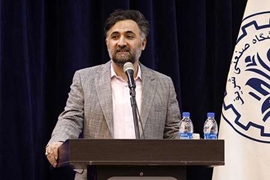
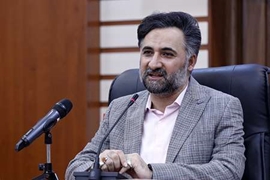
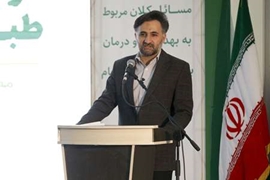
comment